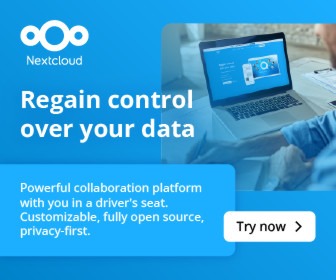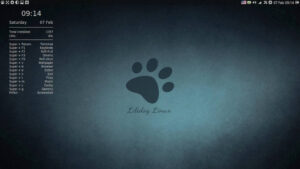It ceased to be funny about the third time I read it. “Is this the year of the Linux desktop?”
Uh, yeah it is. Just like it was in 2014, 2013, 2012…It just depends on whose desktop you are talking about.
The topic came up when an old friend, Richard, and I began an email exchange to catch up after a number of years. He’s a senior Linux admin for one of the major New York City hospitals and the topic turned to some things we’ve noted over time. We talked about how Linux isn’t. It isn’t in the public awareness. It isn’t in stores. It isn’t offered by OEMs in any real quantity. It isn’t visible at all. Richard stated that it was probably better that way. Why he said that, I don’t know. I’ll have to bring that up again, but I have a fairly good idea.
 When I stated that the Year of the Linux desktop has already happened, I am speaking about hundreds of individual school-age students who use their Linux computers for day to day work. To our Reglue kids, Linux is a way of life. It is the way they access their computers and hence, the world.
When I stated that the Year of the Linux desktop has already happened, I am speaking about hundreds of individual school-age students who use their Linux computers for day to day work. To our Reglue kids, Linux is a way of life. It is the way they access their computers and hence, the world.
But in the larger sense, in the sense that it will become a household product like Microsoft Windows, I think we all know we’ve lost that war. We were screwed from the gate, as far as ever seeing a competitive version of Linux in the market place goes. Why? Whew, them be lots of reasons.
First? Money.
Even if we decided, or the marketplace decided for us, which Linux would hit the shelves and OEMs, there’s a matter of telling people about your product. Yep…advertising. No, not the flashing browser monstrosities on Pogo that blind you to all but the three inches in front of your face. We’re talking about getting into Mr. and Ms. America’s living rooms and cars. Getting into their awareness and causing people to talk about what you have to offer. Yeah, advertising. That’s where we failed. We failed because we simply weren’t ready. We didn’t have a product ready for the marketplace.
No one came forward with a marketable product. Many will argue that Ubuntu has been ready for years. Really? I may agree with you on some level. It probably is ready for market now, from a quality stand point. But from a public point of view? Up until the past couple of years, only a tiny percentage of our clients had even heard of Ubuntu or Linux. The term “Linux” drew blank stares and a general posture of waiting for the subject to move along to the next topic. There has been a lot of speculation as to why Mark Shuttleworth has not gone to market with Ubuntu. We’re only left to guess as to why.
My guess? He knew it wouldn’t work. He knew that Microsoft Windows and Office products are so deeply entrenched into the American enterprise psyche that he would have taken a good old fashioned behind-the-barn financial ass whoopin’. My buddy Richard argues that Shuttleworth’s Linux experiment could have been bled dry by launching a disastrous ad campaign. Maybe that’s true and maybe it isn’t. He didn’t get rich by not knowing when to pull the plug.
In the Book Of Ken, that’s exactly how I think it happened, or didn’t happen as it stands now.
But ho-ly cow, how things can get twisted around. While people like me were bemoaning the fact that Linux wasn’t visible in the marketplace, Google got all stealthy on us. Google made damn sure that Google Chrome was going to be a success. Their bare knuckle tactics in getting Chrome into our minds and on to our computers were surprisingly successful. I use Chrome and I hate it…I use it simply because it does the job better on many sites than Firefox, or Opera for that matter. The next logical step? Say it with me…
Chromebook.
While throngs of tech writers and pundits foretold the gruesome death of the Chromebook, it slowly took root in the classrooms across America. I can’t speak to the rest of the world, but in US classrooms it began doing some pretty amazing stuff. Like here in my little town that can’t get the electricity back on for three days after a storm. The Taylor Independent School District decided they were done with Mac products, and ordered one-for-one exchanges for Chromebooks. Why?
Because they are cheap and Google offers some pretty generous discounts for educational institutions. Low maintenance, little to no virus hassles and support from just about anyone whose ever turned on a computer. One of our directors is on staff with the Taylor Independent School District. He told me pretty much the same thing I’ve heard from a lot of people: “You have to be a slobbering idiot not to figure it out in an hour or so.”
Yeah…pretty much. And oh, by the way, we can take the win even if it wasn’t the way we planned it. As most will already know, Chromebooks are based on the Linux kernel. Is it Linux? Kind of. Enough to claim the statistics. Folks, my refrigerator runs on Linux. My car navigation is powered by Linux. The point of sale software for Frys Electronics is Ubuntu based. The alarm system that protects the Reglue World Headquarters is running Linux.
So no…me and my little radio commercial several years ago really didn’t do much. Well, maybe it showed me just how afraid most computer users are of change. Everyone liked the idea, but only seven out of a hundred had any inclination to explore Linux. That pretty much tallies up with what I’ve experienced in real life as well.
As for the lack of major advertising for Linux, now that I think about that for a bit, I might have to admit the truth. Mark Shuttleworth knew exactly what he was doing all along.
Ken Starks is the founder of the Helios Project and Reglue, which for 20 years provided refurbished older computers running Linux to disadvantaged school kids, as well as providing digital help for senior citizens, in the Austin, Texas area. He was a columnist for FOSS Force from 2013-2016, and remains part of our family. Follow him on Twitter: @Reglue







Hey Ken,
Perhaps the “desktop” is being pushed to morph into a very simplistic version of itself. With Chromebooks, no more drivers and viruses cause the whole “desktop” isn’t really a desktop with its classical sense (icons on the screen and file systems the same as traditional Gnome/KDE/XFCE/LXDE environments). No more hassles as everything is on the cloud/google drive/dropbox etc… but you gotta use google apps, google drive, google cloud print etc etc etc.
The Very vendor lock-in that Linux is trying to solve by doing things the way it does. Same thing with Android… at least with Android you can (but for how long I don’t know) still use F-Droid to install FLOSS Android apps and you can still root your phone/tablet and have some degree of control
over your device.
Corporations are feeding into people’s tendencies to not want “complicated” things when it comes to computers and devices… when some things have to be complicated in order to have any measure of control over your hardware & software.
I just want to put this question out there… and hope it starts a good conversation about where Linux should be going…
If we make things so simple on Linux that someone has to be a slobbering idiot NOT to figure it out in an hour… what fun will it be to use a computer with Linux on it (whether it’s GNU/Linux or Chrome/Linux or Android/Linux or Whatever/Linux). What kind of value do we want people to feel they’re getting by using a traditional Linux desktop vs an Android/Chrome (phablet/tablet)ized system where the only actions they have to do is point and click and store everything on the public cloud (with little or no private backups and little or no offline ownership of one’s data)?
When machines are becoming less powerful and cheap but more “market approachable” and locked up (ie how easy it is for a kid or an adult to install Linux on a Chromebook)?
Market share is good when the people in the market get what they want… whether they care enough about it or not… there should be a choice… that’s why we got Linux and GNU and GPL and FLOSS, right? If you have devices locked up/tinker-proof what you’re really offering people to buy and use is just a black box. Is that really a choice?
Hey guys! 🙂
Let me look at it, from a defferent point of view.
Linux is not only mainstream, but the de facto standard a) at servers and b) at mobile phones (Android).
In the first case, many system administrators adopted Linux for their servers, ages ago, mainly because of the excellent work by Red Hat (distribution, support etc).
In the later case, Android became the mobile standard, because Google did exactly the same thing, in mobile world.
In both cases, success came because a corporation did the necessary background work (in order to gain profit of course).
Canonical made many mistakes and alienated a vast number of users.
It has no chance to take Ubuntu to the masses.
Personally for my own computer, I’m using Debian and I like it very much, because it’s lets say “DOS on steroids”.
It is what a modern OS should be (at my own opinion).
It allows you, to do whatever you want, to your very own system.
Yes, I’m 47yo and an ex-DOS guy! 🙂
However I can’t suggest to any friends of mine, except for those who I can provide, personal technical support.
Worst than that, Debian or any kind of so called “Academic” or “Institutional” (in opposite of the “Corporate” ones) distributions, are facing many many troubles, in the middle of the worldwidth economic crisis.
Personally I think that Linux can (and must be) mainstream.
Red Hat and Google already did it, at other than desktop ecosystems (at servers and mobiles).
Canonical failed because of its mistakes, but it was Canonical’s failure, not of Linux.
I hope at the future, a more serious approach will be taken by another corporation, that will bring the philosophy of GNU (of freedom actually), to our fellow citizens.
Americans (as well the rest of citizens around the globe), proved that are ready and mature to accept it.
They already did (see Android case).
The desktop Linux failure (to become mainstream), it was a complete disaster!
But it was Canonical failure. Not the citizen’s.
I’m 100% sure, for the fact that the GNU philosophy (and Linux like OSes) will become the de facto standard, at the desktop too.
When? I can’t say.
Let’s hope this time will not delay very much! 🙂
Bye! 🙂
G.
Just wanted to share a few reasons why my son uses a chromebook that I don’t often see mentioned. At the time (and probably now too), it was the only sub $300 option that would run almost all day on a single charge. This is very important for him at school. Also, being cheaper, we were lesser concerned about it getting damaged or stolen as we would a $600~$800 laptop. Lastly, he touch types so having a keyboard made it more attractive compared to tablets.
Edit my previous post:
*it was the only sub $300 option in a laptop form factor that would run almost all day on a single charge.
Unless Linux can be easily installed across all devices be it mobile,tablet, desktop it will never be adopted anywhere.
Serious question, archuser: why do you insist on trolling this website? They and the commenters don’t need the grief. We get it. You like Windows. Go to cnn.com and join the 3-way fanboy fight.
I tried a Chromebook and hated it — it tasted too much of Google flavored Cool Aid.
After I ripped ChromeOS off it and installed Mint I was much happier with it.
Meh, I’m ambivalent about promoting “Linux on the Desktop”.
I once was a Windows user, when it suited my needs. I dabbled with Linux beginning in the 90’s, but Windows was my primary OS. That changed when I became fed up with the constant intrusion by Microsoft into what I wanted to do. I like to experiment with my machines and by the end it had devolved into fighting Windows, DRM, mandatory software activation, and other restrictions whenever I wanted to do something. Every day and every update brought a new restriction on what I could do with MY COMPUTER. Windows 8’s in your face ads with practically every Metro app were among the final straws, although the overall poor quality of the OS also contributed.
Switching completely to Linux opened my eyes to the freedom I had been seeking all along. Linux does what I want. It gets out of my way and lets me do it, all without some corporate agenda interfering. Along the way I’ve come to respect and finally to demand the freedom that comes with FOSS, primarily espoused by the GPL.
I use Linux because it does what I need and want. I don’t need anyone else to validate my choice to use Linux by agreeing with me. Perhaps selfishly, I only require that enough people use it to ensure hardware/driver support. Anything else is irrelevant to me.
Do I think other people deserve to have the freedom that Linux specifically and FOSS in general provide? Yes, absolutely, and I’ll gladly talk about it with anyone who cares to listen. But that freedom is meaningless unless they want it and approach it with understanding. Trying to lure people to Linux with shiny desktops is a fool’s errand, doomed to failure, even if you appear to succeed. Even if you manage to get everyone to switch, they will have no uderstanding of FOSS principles and the bulk will never care. They will accept proprietary crap, DRM, and invasion of their privacy in the name of convenience. They will accept “app store” shackles in the name of security. They will in fact accept anything in a shiny package because that is what you have taught them.
If you want to make a difference, then teach people about the freedoms of FOSS:
The freedom to do what YOU WANT with YOUR COMPUTER instead of only what some company wants you do.
The freedom to keep your information private instead of being at the mercy of software that will just take it whenever some company decides it is valuable.
The freedom to know exactly what your software does instead of having to blindly trust a corporation.
These freedoms, among others, are why I use Linux. If more people appreciated them, it’d be a different story. We’d have fewer Windows users for sure. But we’d also have fewer people willing to put up with proprietary garbage in Linux distros that make little distinction between FOSS and proprietary in the name of convenience.
It has become fashionable lately to dismiss people who care about software freedom as extremists, going so far as painting them as religious fanatics. It is also fashionable to not care about such things and claim pragmatism is what matters most. I disagree. If we keep pushing for the masses to adopt Linux, even at the expense of the freedoms FOSS brings and what you’ll get is just another guilded cage like Windows, OSX, IOS, Android, or Chrome. It’s not the kernel that makes Linux worth using, it’s the freedom.
I know I’ll probably get a lot of flak for my opinion but….
Its my belief that the people who are willing to open their minds and see what else the world has to offer aside from Windows – MacOS-X etc. should be exposed to Linux in all its forms. From the complicated and totally alien (ArchBang, Semplice, Bodhi etc.) to the ones that are so familiar that it would take them less than a full day to get the hang of it (Linux Mint, Ubuntu, Debian etc.). These are the people who will help to move Linux and open source software into the future, as opposed to the ones who are afraid of anything that isn’t what they’re used to. I’m a full-fledged “convert” and have been since about 2003 / 2004 when my Windows XP machine gave up the ghost, and all my data went with it,after that I was determined to find something that was secure, stable, and didn’t require a huge monetary load-out. I looked at Apple but the money they wanted for their devices was for lack of a better word? “Stupid”. When I looked at Linux back then, it frightened me, there were terminals and lost of windows open all over the screenshots that I saw. I almost threw it in the same category as Apple’s wares! But after doing some reading, and more reading, and even MORE reading…I decided that between the three Linux seemed like the safest one. And I’ve been using it ever since and will NEVER go back to Microsoft’s products.
The problem I have is with the ones who keep looking for a Y.O.T.L.D. (Year Of The Linux Desktop) there really doesn’t NEED to be one, only because the Linux desktop is firmly entrenched where it NEEDS to be, in the homes of thousands of people who have had it up to here with Windows. Does Linux have as much “recognition” as Windows….Android…or Apple? of course not, but with the amount of devoted users who help others make the switch, who then in turn tell others of their move to Linux…slowly but surely the word will spread…and this is minus the billions spent in advertising. I have converted almost an entire TOWN where I live (in the hills pf Pennsylvania) to the point where I’m now being approached by small businesses on the outskirts of NJ asking if I have a solution to help them stay financially competitive without spending lots of money. (Hmmm…CEntOS….or openSuSE for their file servers?..LoL!) I’m not worried about Linux ever gaining market share in the corporate desktop, because it really doesn’t need to be there. Most people who use Linux whether at home or at their place of work…are usually developers, programmers, writers, administrators, etc. but the average number cruncher who works in accounting is perfectly happy to use Excel for their spreadsheets and then go home and use Windows 8 / 8.1 / 10 to go online and shop, watch movies, and use Skype.
It takes a certain kind of person to work with and use Linux and to me if most people whom you introduce to Linux are only interested in watching Netflix or using Skype, then they’ve missed the entire point of your presentation. Windows is simple and offers very little in the way of a learning curve, Android which, as was stated earlier IS Linux is also painfully simple, the push to have everything online floating around in clouds turns the stomach of a typical Linux user, but for the masses it’s just so much easier to have access to photos on their PC at home….their tablet at Thanksgiving dinner, and their phone when commuting to work. I guess everyone’s motives are different when it comes to Linux, but for me it’s all about being untethered from any corporation’s demands. If I don’t want to use a particular application or program? I can uninstall it and find a suitable replacement without worrying about error messages and mysterious application freezes that cause a complete reboot. Ahh yes….I’m a happy Linux user and really don’t give a flying fig if Linux has conquered the corporate desktop wars….as long as I continue to donate to my favorite distros and continue to get the word out to the people I come into contact with I’m sure Linux will be fine….no Microsoft on the other hand has to worry about obtaining enough sales to keep their company afloat…keeping the shareholders happy, keeping their product prominent and in the public’s eye….all without making any missteps, or shipping out an OS that is not perceived as being a buggy, cluttered, and totally insecure hodge-podge of software.
Dimitris, you hit upon a point that a few of my friends were discussing just not to long ago. My coursework in college was a combination of sociology and psychology. The two make an inevitable melding when you “observe the herd”.
Cloud. The Cloud. Private Cloud.
“The Cloud” is an invented phrase for The Enterprise to sell Mr. and Ms. computer user storage space. No more “servers”. No more NAS. No more technical terms to stand between the consumer’s money and the sale point. Just a simple little cloud. A place in space for your digital stuff. How easy? How convenient?
How susceptible for digital rape and plunder…
While the latter was never an intended consequence, it is indeed a consequence of merit. But that aside, it’s been an interesting time to observe how digital and online consumers have taken a seat on a nice fluffy cloud.
The same entity that’s existed for years within a server room. Wanna sell stuff? Use the right words. Simple.
That is bang-on Ken. The really insidious thing is that it has even managed to lull people who have a background and career in computers into a state of utter credulity.
At the risk of shaking my fist and yelling “get off my lawn!”, the Cloud can go stuff it.
I’m not going to pretend that I know what’s going to happen with people’s desktops over the next few years. What I have seen, though, is more people who use a desktop or laptop computer are using Linux than in the past. I also do see more computers being offered pre-installed with Linux from Dell and other vendors. Because of this, I don’t think Linux on the desktop is in any immediate danger of becoming impractical to use, and that’s enough for me to keep using it.
It is interesting, though, the number of people who are not tech savvy who will use a Linux desktop computer given the opportunity. I have most often installed Linux on people’s laptops to give new life to hardware that had fallen into disuse for one reason or another. Either it ran too slowly (including a Windows 8 machine), it didn’t work right anymore (often thanks to malware that may have been removed but left a broken system in its wake), they didn’t have a practical way of re-installing the system, or, recently, their XP system was no longer supported in too many ways.
It’s funny how much more willing someone is to try something new when the alternative is the hardware collecting dust.
Of course, sometimes people are insistent that Windows be used to try and revive this kind of hardware, but that usually doesn’t work. Linux runs better on old hardware than any version of Windows. I find it interesting that even a system like Ubuntu can run circles around XP when you put LXDE or even Xfce on it (even with ‘Bling!’ included 😉 ).